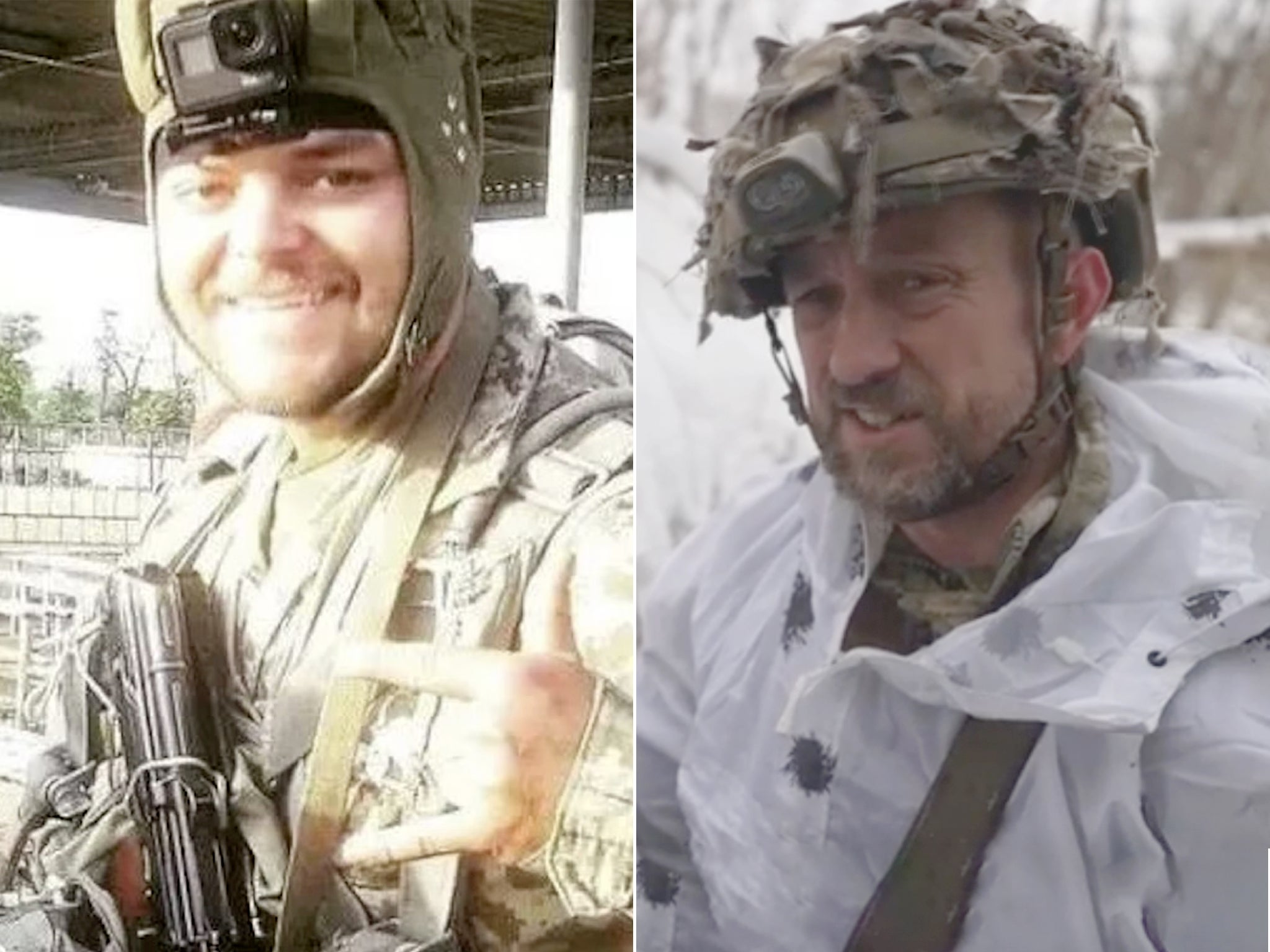Two Britons have been sentenced to death – any foreigner in Ukraine is now at risk
This also potentially sets countries like the UK in a direct conflict with Russia, who no doubt ordered or at least sanctioned the trial, writes Bel Trew


Heads shaved and bowed, the three men are brought one by one into the unrecognised “courtroom” in the unrecognised state: the so-called pro-Russian Donetsk People’s Republic (DNR).
They look exhausted. All three men – Aiden Aslin, 28, Shaun Pinner, 48, from Newark and Bedfordshire, and Moroccan citizen Saaudun Brahim – survived some of the fiercest fighting during Russia’s invasion of Ukraine. Then to be captured and sent to trial.
Aslin, a former care worker who fought with the Kurds against Isis in Syria and then joined the Ukraine marines in 2018, appeared in photos bruised and bloodied. Those images have been paraded all over Russian Telegram channels and state television.
His last message posted to his Twitter account had said they could no longer defend the besieged coastal city of Mariupol and had no choice but to surrender to Russian forces. “It’s been a pleasure everyone – I hope this war ends soon,” he added.
Now he, Pinner and Brahim have been sentenced to death by firing squad on a slew of charges including terrorism, being a mercenary and working toward a violent overthrow of power. The verdict, the head of the panel of judges told Russian-state Interfax agency, was “guided by… [the] main, inviolable principle of justice” and they have a month to appeal.
It has, justifiably, sparked international uproar. The UK was quick to slam the whole proceedings as a sham, saying the two Britons had served in the Ukrainian army since 2018. This makes them prisoners of war (PoWs) and so protected by the Geneva Convention which forbids soldiers from being tried for the very act of being combatants.
The UN has said because of this, it is a grave breach of the Geneva Conventions and a war crime. Experts told The Independent that even if they were mercenaries (which they are not), the action of the court was a possible war crime in itself. This, therefore, sets an extremely worrying precedent for all foreigners in Ukraine, not just those who are engaged in combat.
“[Under international law] there is supposed to be some kind of factual impartial status determination hearing prior to the trial to determine whether someone is a mercenary or a member of armed forces,” said Rachel Denber, deputy director of Human Rights Watch’s Europe and Central Asia division.
“It was very clear that it did not take place,” she added. She said that even without knowing the details of the proceedings in the trial, or even the status of the men, because of this it was a sham, and so a war crime.
This, she said, was extremely alarming. “I am concerned about the safety of these men, and the message that it sends is that they will do it again. The DNR has demonstrably claimed that they execute people for things like marauding. They want to send a clear message.”
While Aiden and Shaun joined the Ukrainian military four years ago, since President Putin launched his ferocious invasion, Ukrainian officials say more than 20,000 male and female volunteers from more than 52 countries have flocked to Ukraine to make up the newly formed foreign legion.
It’s impossible to verify that number, but I have spoken to several of the men from the UK, US and Canada who signed up. Some had combat experience, others were just moved by news reports from the frontline. Two men sold swathes of their belongings – including motorcycles – to fund the trips to the country almost on a whim.
It’s incredibly dangerous work. Just last week, the Facebook group of “the International Legion of Defence of Ukraine” posted that four of its members, including a Frenchman, an Australian, a German and a Dutch citizen, were killed in the fighting.
To keep up to speed with all the latest opinions and comment, sign up to our free weekly Voices Dispatches newsletter by clicking here
But now the foreign legionnaires also face the added danger of capture, sham trials and the firing squad. As they are formerly enrolled in the Ukrainian army and so subject to command structure and abiding by laws of war, foreign legionnaires are entitled to PoW status. But the latest case shows that the DNR is not going to respect that.
It means any foreigner in Ukraine is at risk of this. Even those who are not combatants.
It is clear that the DNR wants to use the cases to pressure and embarrass the UK government for supporting Ukraine’s war efforts. But it also likely wants to use the men as leverage in key moments of negotiations, such as prisoner swaps. Having several foreign nationals in their prisons gives them a serious and worrying power.
The concern is they will actively seek out foreigners in the future and there is little countries like the UK can do about it. It also potentially sets countries like the UK in a direct conflict with Russia, who no doubt ordered or at least sanctioned the trial. This could cause myriad more problems in the future.
For now the British government and its allies must work hard to bring these men safely home, however tricky that might be, before it is too late.
Join our commenting forum
Join thought-provoking conversations, follow other Independent readers and see their replies
Comments
Bookmark popover
Removed from bookmarks